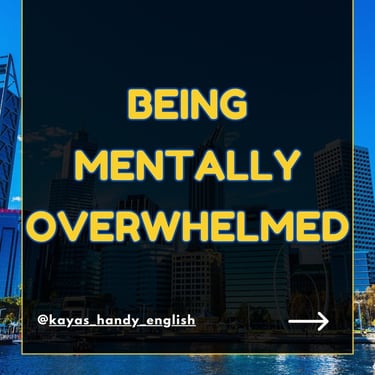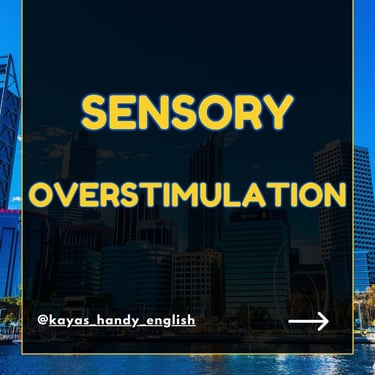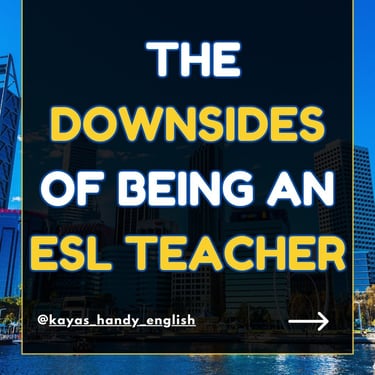[BLOG] Downsides of being an ESL teacher
Not sure if teaching English is for you? Read this blog post about the disadvantages of being an ESL teacher and find out!
Kaya
2/18/2024
Please keep in mind that the opinions posted on this blog are my own.
Everybody might have a different experience and opinions, and that's OK.
It takes time to become independent
I know, it doesn't sound so original, as every job requires training programs, internships and shadowing. Not many jobs, however, are so widely advertised as “be independent - no experience required!”
To become an independent ESL teacher one must work in several places and/or (more “and” than “or”), go through fascinating but often energy-draining training.
If you want a comfortable career and not just a gap year job, the best way to find what you are looking for in ESL is to work with different age groups, a variety of course books, and a variety of schools.
Language schools are, in my opinion, the best choices for new teachers, even though some of them might limit their creativity. I can't imagine developing so much without the language schools I worked for, even when sometimes I was snowed under administrative tasks and exhausted after my daily jumps between kids groups, teenage groups, and adult groups; from beginners through CAE and Business classes, back to pre-intermediate levels.
Sensory overstimulation
Have you ever been to a music festival with five stages with different kinds of music, 500,000 people chatting, singing and dancing, laser shows, and dozens of mosquitoes trying to make you their dinner? This is what teaching is like for many, especially neurodivergent people. If you don't get overstimulated easily and/or you don't have ADHD, I am very positive you can skip to the next paragraph.
I found out about my ADHD after having taught for 15 years and had I known sooner, I might have avoided exhaustion, insomnia and burnout. If you do have ADHD or other “gifts of nature”, you are probably a perfect fit for ESL teaching (more on that another time!), but you should take into consideration that it might be more difficult for you until you find your perfect routine. Even without any disorders, teaching is a tiresome and often stressful profession.
You might get psychologically overwhelmed
As you become a regular part of life for many people, you are also included in their happy moments such as getting a good grade, a new job, a new hobby, and so on.
Unfortunately, you might also be included in your students' waves of demotivation, health issues, professional problems, breakups, financial troubles and other obstacles that can negatively impact their attitude towards learning and you personally.
It might take a lot of time to realise that this is not personal and everybody has bad days. You might also care for them more than you should and wish them all the best. You might become their friend or their “bartender” (a self-made therapist), and it might be a lot for you to handle.
As teachers, we are usually quite empathetic so it might cross our minds to try to save everyone from their problems. Your job is to teach, encourage, listen and be empathetic, not to be their therapist - as hard as it might sound.
You are often alone in the crowd
No, I don't mean your DOS doesn't care.
I don't mean your colleagues are useless and not fun.
I don't mean you have no friends.
Being alone in ESL can mean multiple things.
If you choose one of the popular, far-away directions of lucrative English positions you might find yourself in a culture completely different to yours. As much as I think of this situation as mostly a “pro” for ESL teaching it still poses some issues. It could be hard to form friendships or relationships as people move after their one-year contracts, you could become homesick as going home for a week is usually not an option, and you might be bound to spending time with your colleagues who might not be “your kind of people”.
Obviously, there are ways to overcome it, but teaching English in a distant land is just not for everybody.
Low wages
Last but not least - wages.
I'm extremely excited to see that this topic is getting more and more coverage in the teaching community. Again, every job starts with lower wages, I believe it is natural. A student should not earn as much as an experienced teacher. Junior wages can be demotivating if it's your full-time job.
Once you are more experienced you should (and hopefully you will) earn more, as there is a lot of money to be made in ESL, so hang on tight, learn as much as you can and keep gathering that experience for when you're ready to become more independent.
I understand if this short list of cons of being an ESL teacher sounds demotivating and dramatic, yet it wasn't my intention. ESL is often advertised as an adventure of a lifetime, where all materials are given, everything is paid for, and you only show up, sing some songs, and collect the coins. And if you're lucky - it's true.
Having said that, I wish somebody had told me about these little downsides when I started teaching. I would have still gone this path, but I would have been more prepared for these obstacles












Cons of being an ESL teacher
Every job has its ups and downs, and no job is perfect. Choosing a career, even if it's temporary, can be a huge time, money and energy-consuming task. Teaching ESL is one of the most popular options for many people who want to travel, meet new people and earn some money but is it a career path worth considering?
Looking for something more optimistic?
Check out this blog post: The Advantages of being an ESL teacher
Get in touch!
Copyright Handy English 2021
”I used this with an adult ELL tutee of mine. I appreciate that the language was accessible for multiple proficiency levels, but the content wasn't obviously geared for children and still useful for older learners.”
August 7, 2023
”Another great resource from Handy English! I used it to give my students more in-depth practise into quantifiers and restaurant language. It's great resource and can be used after the students learn the basics of language for the restaurants and quantifiers. Definitely helped solidify what they learnt.”
February 5, 2023
”Love this resource. Great for fast finishers and also those in small ESL groups. Great for all macro skills as discussion and brainstorming is a great precursor for writing submissions.”
- Gail M.
June 25, 2023
Here's what other ESL Teachers say
Handy English: 4.8/5
”This was a wonderful resource for my students. It helped me introduce them easily to new concepts and it was quite engaging. Thanks!”
- Kiara B.
October 10, 2023
”Great resource for learning vocabulary, which supports comprehension and speaking skills.”
- Lori-Ann W.
September 29, 2023
”What a great way to get a healthy debate going. My students struggle with impulse control and they all have kept it kind and appropriate.”
- Alicia H.
September 17, 2023






